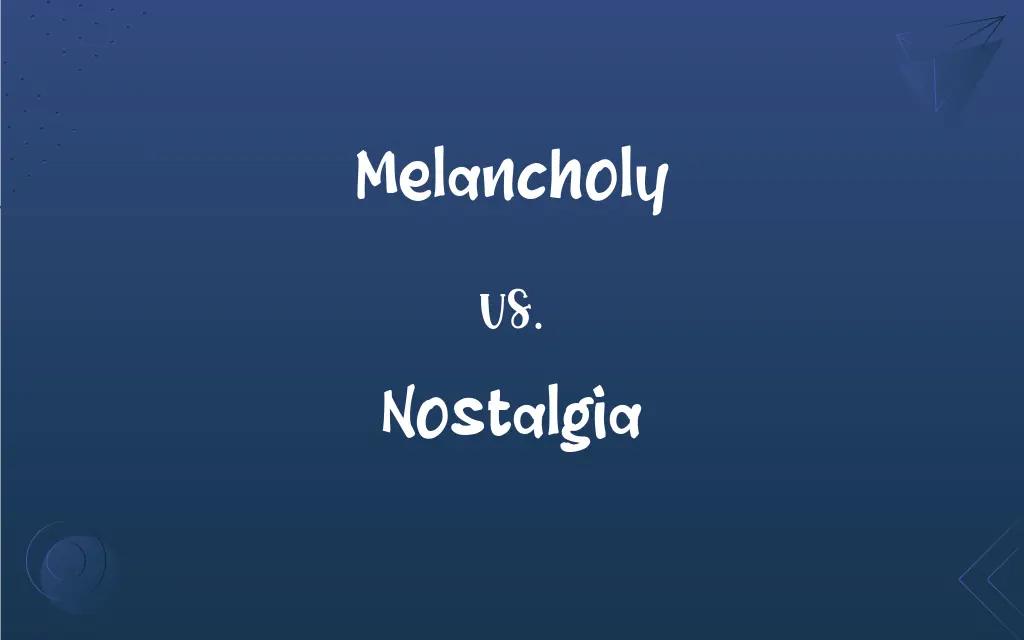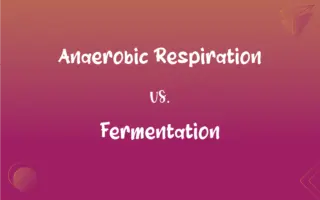Melancholy vs. Nostalgia: What's the Difference?
Edited by Aimie Carlson || By Harlon Moss || Updated on October 28, 2023
Melancholy is a deep, lasting sadness; nostalgia is a wistful longing for the past.

Key Differences
Melancholy and nostalgia are both complex emotions, yet they differ in their origins and nature. Melancholy is a profound sense of sadness or sorrow, often without a specific cause. Nostalgia, on the other hand, arises from memories of past experiences or times, creating a yearning for the past.
While melancholy can be a pervasive feeling affecting one's overall mood and disposition, nostalgia specifically relates to a sentimental longing for past moments. Thus, while someone might feel melancholy without knowing why, nostalgia always ties back to specific memories.
Melancholy often conveys a heavier, more sorrowful emotion. It might arise from existential thoughts, personal losses, or even for no discernible reason. Nostalgia, in contrast, is bittersweet. While it carries a sadness for times gone by, it also brings pleasure in reminiscing about those times.
Both melancholy and nostalgia can be triggered by various external factors, like music, places, or smells. A song might bring someone to a melancholic state by its tone or lyrics, while the same song might evoke nostalgia in another due to personal memories associated with it.
In literature and art, melancholy is often depicted as a reflective, somber state, while nostalgia might be portrayed through flashbacks, old photographs, or characters reminiscing about their past. Both emotions, though distinct, provide depth to human experience.
ADVERTISEMENT
Comparison Chart
Nature
Deep, lasting sadness.
Wistful longing for the past.
Trigger
Often unspecified or existential.
Specific memories or past experiences.
Feeling
Generally sorrowful.
Bittersweet – mix of happiness and sadness.
Usage in Art
Depicted as somber or reflective.
Often shown through flashbacks or reminiscence.
Relation to Time
Present-focused or timeless sadness.
Always related to past memories.
ADVERTISEMENT
Melancholy and Nostalgia Definitions
Melancholy
A disposition towards gloominess or depression.
He always had a melancholic air about him.
Nostalgia
A yearning for the return of past circumstances.
The reunion was a moment of joy and deep nostalgia.
Melancholy
A deep, reflective sorrow.
Her melancholy thoughts kept her awake at night.
Nostalgia
A bittersweet remembrance of things past.
His stories of childhood were filled with nostalgia.
Melancholy
A pervasive feeling of sadness.
The rain brought a sense of melancholy to the evening.
Nostalgia
A wistful desire to return to former times.
The vintage fair evoked feelings of nostalgia among visitors.
Melancholy
A feeling of pensive sadness without an obvious cause.
The autumn weather often stirs a sense of melancholy in many.
Nostalgia
A sentimental longing for the past.
Hearing the old song filled her with nostalgia.
Melancholy
A somber state of mind.
The news cast a shadow of melancholy over the town.
Nostalgia
The pleasure and sadness of remembering past events.
Looking through the photo album was an exercise in nostalgia.
Melancholy
Sadness or depression of the spirits; gloom.
Nostalgia
A bittersweet longing for things, persons, or situations of the past.
FAQs
Is nostalgia always related to personal memories?
Typically, yes. Nostalgia arises from past experiences or times.
Are melancholy and nostalgia considered negative emotions?
Not necessarily. While melancholy is often sorrowful, nostalgia can be both happy and sad.
Can melancholy occur without a reason?
Yes, one can feel melancholic without a discernible cause.
Can music evoke both melancholy and nostalgia?
Absolutely, depending on the individual's association with the music.
What is the primary difference between melancholy and nostalgia?
Melancholy is a deep sadness, while nostalgia is a longing for the past.
Can a place or smell trigger melancholy?
While more common with nostalgia, certain places or smells can evoke melancholy in some individuals.
Is melancholy a mental health condition?
While it's an emotion, prolonged melancholy might indicate a mood disorder.
Is there a way to overcome melancholy?
Activities, therapy, or social interaction can help, but it depends on the individual.
Can melancholy be a temporary feeling?
Yes, it can be fleeting or more lasting, depending on the circumstances.
Can melancholy be a source of creativity?
Yes, many artists channel their melancholic feelings into their work.
Can nostalgia lead to melancholy?
Yes, if the longing for the past brings sadness.
How are melancholy and nostalgia depicted in literature?
Melancholy is often shown as somber reflection, while nostalgia may use flashbacks or characters reminiscing.
Can nostalgia be about recent events?
Yes, it's about past memories, regardless of how recent.
How is melancholy different from sadness?
Melancholy is a deeper, more pervasive feeling than mere sadness.
Can you be nostalgic about something you didn't personally experience?
Some people feel "cultural" or "historical" nostalgia for times or events they didn't directly experience.
Do certain seasons evoke more nostalgia?
Often, seasons like fall or holidays might trigger nostalgia due to associated memories.
Why might nostalgia be beneficial?
It can provide comfort, a sense of identity, and a connection to the past.
Why do people feel nostalgia?
It's a connection to personal past experiences or memories.
Is nostalgia unique to humans?
While humans are most known for it, some studies suggest animals might experience a form of it.
Can art be a way to express melancholy?
Absolutely, many artists use various mediums to depict and process their melancholic feelings.
About Author
Written by
Harlon MossHarlon is a seasoned quality moderator and accomplished content writer for Difference Wiki. An alumnus of the prestigious University of California, he earned his degree in Computer Science. Leveraging his academic background, Harlon brings a meticulous and informed perspective to his work, ensuring content accuracy and excellence.
Edited by
Aimie CarlsonAimie Carlson, holding a master's degree in English literature, is a fervent English language enthusiast. She lends her writing talents to Difference Wiki, a prominent website that specializes in comparisons, offering readers insightful analyses that both captivate and inform.































































